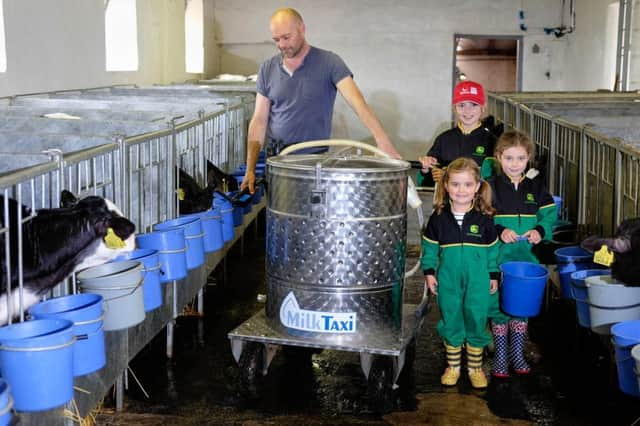A practical solution for heat detection and herd fertility


If someone offered to take full charge of the reproductive management of your herd and achieve these improvements for you, you would be sceptical. Yet over 90 herds which milk 27,500 cows in Northern Ireland use this service which, they claim, not only helps with fertility management but also provides data analysis which enables them to plan the best way forward for their enterprise.
Genus ABS is offering this service to Northern Ireland farmers whereby they will walk your herd every day of the year and will mark cows and inseminate them at the optimum time. But will the cost of this service be justified?
Advertisement
Advertisement
David and Barbara Jackson, farming near Bangor Co Down, milk 270 cows in partnership with their son Stephen and farm staff Julian and Dean.
Stephen started RMS in February 2016. He explains: “We were doing all we could, making the best silage, using a nutritionist and regular vet visits but we weren’t achieving the results. We decided to start RMS, we knew it meant an extra investment but we hoped that the benefits would come in time. All the work with Jubilee Veterinary Centre and Farm Gate Nutrition clicked when the fertility work by RMS started. We immediately saw benefits to the system, our projected Calving Interval dropped and we had detailed day to day cow management information.”
James Woods, RMS Manager with Genus ABS, points out that the Reproductive Management System (RMS) is much more than a heat detection and insemination service. He states that getting cows in calf involves a vast range of management factors including nutrition, housing, health and veterinary input.
By working closely with the on-farm team, including the nutritionist and veterinary surgeon, RMS staff have been able to help farmers make significant improvements, not only in reproductive management but also in herd performance and profitability.
Advertisement
Advertisement
James points out that the average pregnancy rate in the UK has fallen to 13% and once pregnancy falls below 13% herds can no longer produce sufficient replacements to replenish the herd, whereas they could be in a position to have enough replacements and have extra cash flow from beef calves sold.
Stephen adds: “We are now 16 months on RMS and our results are better than expected. We started with a pregnancy rate of 8% and now are at 23%. This in turn has meant that our average DIM has gone from 230 down to 180 DIM. Over the last six months our daily milk yield per cow has averaged 32 litres compared to 25 litres for the same period last year. The calving interval has gone from 465 days to 405 days and the percentage of the herd in calf by 100DIM has more than doubled up to 56%.
“We have gone from struggling to have enough heifers to maintain the herd to now being in the position of having plenty of heifers as well as a cash crop of beef calves to sell. The extra revenue from milk sales as well as calf sales more than covers the cost of the system. From a health and safety point of view, it is a great peace of mind knowing that there are no more bulls running with the herd.”
Stephen added: “We are now identifying problem cows and the best performers. Replacements are bred from the top 60% of the herd and beef sires are used on the remainder. The RMS technician walks and chalks the herd at the same time every day monitoring heats and then inseminating the relevant animals. The staff on the farm could never devote the time and attention to detail that the technician does. Results are recorded and analysed and used for future planning. It is an excellent service where the benefits far outweigh the costs.”
Advertisement
Advertisement
James Woods adds that it is beneficial to involve the farmer’s veterinary surgeon and nutrition adviser when making plans for this service to maximise the benefits. Andy Mayne from Jubilee Veterinary Centre, Newtownards complements the RMS work being carried out by Genus on Stephen and David Jackson’s farm.
He said: “Reproductive management needs all the links in the chain to be secure. It is easy to blame the cow but she is not always the weak link. Genus will carry out heat detection and inseminations and will keep detailed records of these. They can then inform me of cows that should be PD and cows that have been running too long without coming in heat. That way we can spot cows that may have a silent heat, a cyst, an ovary problem or just simply need a better plane of nutrition. All of this information again goes into the Genus system so that we build up a complete picture of the entire herd.
“If a cow has too short a dry period then she will not have enough time to recover for the next lactation and if she does not get in calf in time then valuable milk production is lost. You have only 90 days to get the cow in calf in order to have a calf every year and optimise performance and profits. It needs everyone in the chain communicating and keeping a detailed record of their work and observations.”
Farmers who wish to have an initial discussion about the RMS service without obligation can contact James Woods on 077 7222 7886.